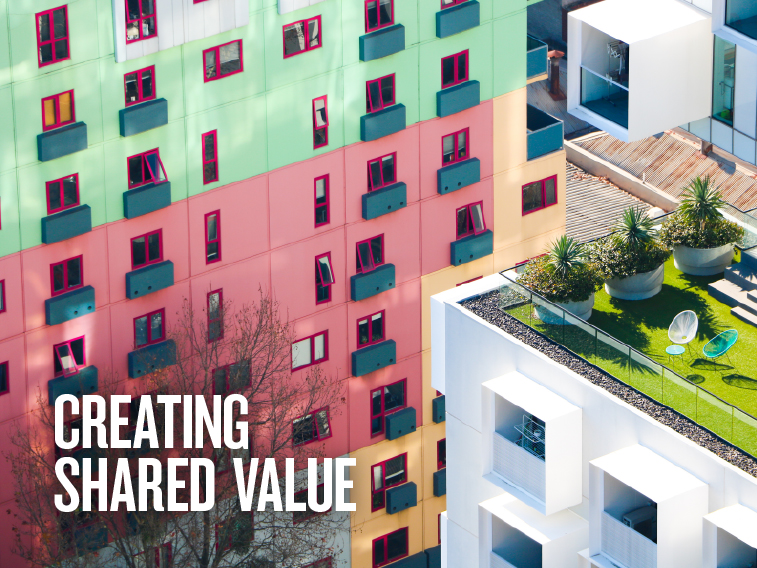On a seasonally adjusted basis, the NAB Online Retail Sales Index recorded a drop in growth in July


Insight
Customers and investors alike want companies to create a positive contribution to society, alongside profit.

Corporates have long talked about sustainable business but recently, we’ve seen a broader definition of sustainability in these conversations. We’ve moved beyond strict definitions of “green” and “corporate responsibility” to viewing sustainability as one of the most strategic issues for CEOs and Boards. There’s a clear imperative to shift to long-term thinking as well as focusing on rebuilding trust in the wider community. These are prominent issues facing all industries, including banking.
At its core, sustainability focuses on creating long- term sustainable value. True long-term sustainable value can only flourish in healthy economic, social and environmental conditions, where we have a holistic approach and a broad focus that goes beyond short-term financial returns. The narrative around the social contract of business has come to the fore and we’re asking what contribution business is making and how is this impacting broader society?
Our customers, and in turn their customers, are demanding a wider societal focus but investor funds are also playing a role. Significant parts of our global investor community are now speaking as socially responsible investors, and they’re calling on companies to create a positive contribution to society alongside profit. The very fabric of the global investment environment has shifted. Increasingly, evidence suggests that if companies don’t take a broader view, they won’t survive, as customers and investors choose to buy and invest elsewhere. With this shift, however, comes huge opportunity.
So how will business embrace this opportunity and leverage our position to think differently about creating value in the new economy? “Shared value”, a term first coined in 2006 by Michael Porter of the Harvard Business School and Mark Kramer of social impact advisory firm FSG, may be the answer. Their definition of shared value describes how successful business strategies can also produce positive environmental or societal outcomes – the intersection of commercial opportunities and social or environmental needs.
When we have a commercial opportunity, a social or environmental need and importantly, the expertise to deliver real outcomes, we create shared value. Using NAB’s Clean Energy business as an example, we have built a leading global business which ranks as number 1 in Australia¹ having delivered 129 clean energy projects and 19 gigawatts of clean energy from wind, solar, biofuels and other sources. Critical to the creation of shared
value is the ability to measure the financial and social or environmental impact of an activity, as we can do in this instance. With that in mind, we believe we can help our customers to discover their own shared value “sweet spot” across a range of industry sectors and different types of companies.
Identifying opportunities to deliver in this new shared value economy isn’t always easy. Nor is the process predictable or fast. It takes belief, investment and a willingness to experiment. An important precursor is thought leadership. We’re proud of our 2019 flagship thought leadership project – the Australian National Outlook (ANO) — produced in collaboration with the CSIRO and more than 50 leaders from over 20 business, community and non government organisations, all committed to building a better future for Australia. The project examines some possible future outcomes for Australia up to 2060 and is designed to stimulate a national discussion and encourage considered action.
Importantly, the ANO considers economic, environmental and social outcomes, acknowledging the importance of this new holistic economy where sustainable and socially impactful business models will find success. NAB has responded to the report findings with tangible commitments such as:
Bringing together an ecosystem of ideas, support and conversations is a first step towards that all-important shift in business culture. Once our thinking is aligned towards shared value and societal and environmental needs, we can follow with product and service innovation – and ultimately delivery, all supported by our deep sector expertise.
Today’s approach requires a collaborative effort among businesses, government, regulators and communities to seek out and develop business activities with the capacity to deliver measurable societal benefits and financial returns. Much of this comes back to culture. Indeed, the ANO report identified a “culture shift” as one of the prerequisites for a more prosperous future, calling for broader decision making to include social and environmental outcomes. We look forward to working with you to deliver sustainable and meaningful success in this exciting new economy.
This article was originally published in 2020 Outlook: Creating Opportunities- read the full magazine or download this article.
¹ Number 1 ranking in Renewables in Australia over the last 10-year period by both deal count and transaction value – IJGlobal.
Speak to a specialist
© National Australia Bank Limited. ABN 12 004 044 937 AFSL and Australian Credit Licence 230686.